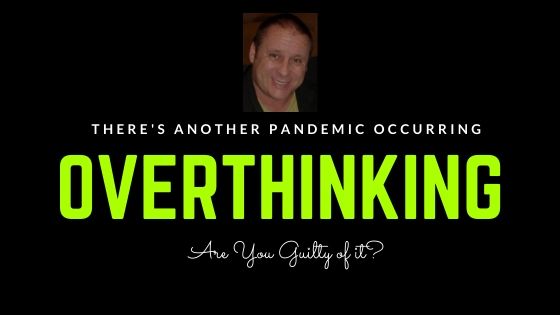
There's another Pandemic occurring - Overthinking!
Are you the type of person who tends to beat yourself up when you make a mistake? Do you fret about things that are out of your control? Do you recognize that you have a problem of overthinking? Do you struggle to quieten your mind? Do you repeatedly relive embarrassing moments in your life?
Do you ask yourself often, what if' questions? Do you tend to think there's a hidden meaning in things people say to you? Do you find it difficult to stop your mind from worrying?
Let's face it, we all experience overthinking at some point in our daily life. And, in many instances, two variables are always in play - One being, that often your thinking patterns are related to the past, or secondly, they are related to the future in some way. Furthermore, a true 'over thinker' will find it hard to diffuse these constant barrages of thoughts - that is, until its takes a serious toll on their well-being.
Do you think that you may have a problem of overthinking? Maybe you should read on and learn more, so you can make that decision.

What is Overthinking?
"Overthinking is the process of
constantly analyzing and anguishing over one’s thoughts. It may include
rumination, in which an individual is stuck mentally rehashing their
past or present decisions and/or actions." [3]
Overthinking, can be difficult to recognize and you can easily get caught up in a vicious downward spiral -
which in turn, can make it harder for you to enjoy life. Experts often refer to this mind problem as, 'analysis paralysis.' Personally, I like to refer to it as the 'monkey mind' whereby your thoughts are similar to a monkey jumping from one branch to another.
Additionally, it has the potential to cloud your judgement, affect decision making and prevent you from taking positive action. In fact, if it continues, everything can be debilitating - even to the point that you may find it hard to get out of bed in the morning.
Of course, were all guilty of overthinking a situation occasionally. But if you're a true over-thinker, you'll struggle to quieten the constant barrage of nuisance thoughts.
Research on Overthinking
In fact, worrying and ruminating over something is not helpful in terms of your mental health, and its likely to trigger other problematic issues. Which in turn, can also have another negative ripple effect - yes, you guessed it, more overthinking. Often, people may ruminate things in their heads as a form of
problem solving and think it has some therapeutic benefit. Yet, this couldn't be further from the truth.
Ruminating isn't the same as problem solving.
For instance, research among the Psychology circles links overthinking to psychological problems - such as anxiety or depression. It can even lead to a level of daily misery, stress, or even reaching a constant state of anguish. It can also interfere with day-to-day problem-solving - as, it can lead you onto dwelling on the problems or over-analyzing everything, rather than looking for an adequate solution. [1]
Other studies, such as the one published by the Harvard Medical School in the U.S. highlighted that overthinking can impact emotional regulation and cause sleep disturbance. This study found that excessive brain activity could even lead on to a shorter life.
Their researchers used a sample of people ranging in age from 60s and 70s, and compared their brains to those who lived to be 100 years or older. The results showed study that those who died at younger ages had significantly lower levels of a protein called REST (RE-1 Silencing Transcription), which quietens brain activity. [2]
In short, excessive thinking causes excessive brain activity, leading to a depletion in the protein REST.

Why do you Overthink?
You may overthink because you have too many things going on in your mind or you are unable to prioritize things in your daily life. You may overthink, because of something that's worrying you, or your unable to accept the truth about something or you have experienced a failure of some sort. Maybe, your thinking about a decision of some sort, that doesn't have to be made yet, or your seeing problems that in reality just don't exist.
According to licensed Psychologist Dr. Jeffrey Huttman, he shed more light on this overthinking tendency, stating that it's very common and there can be various triggers. For instance, it may be caused by self-doubt or a lack of confidence; to self-esteem issues; or, even concerns about repeating past thought patterns (e.g. a prior bad or traumatic experience). [3]
How to Stop Overthinking
The six million dollar question is, How do you get your brain UNSTUCK?
Learn to Say No!
Sometimes people overthink because they're indecisive about something. Hence, a good technique is to learn to say 'NO'. Being more decisive about something can assist you to become less prone to thinking too much or pondering.
Just do it - and don't put things off!
Procrastination can often induce overthinking, so learn to become more decisive in your day-to-day decision making.
Get yourself more organized!
Make a priority list of tasks that you need to do, and then place them somewhere so you can see them each day - and once achieved, tick them off as you go.
Let go of negativity!
Dwelling on negative thoughts can fester more problems. So, always try to have the philosophy of turning a positive into a negative. Strive to see the glass as half full, and not half empty. Positive thinking actually works.
Slow the mind down each day!
Start by turning off all your technology devices, and find a quiet spot where you can avoid interruptions and 'meditate'. If you don't know how to, then learn this powerful and free technique and then practice it for 10-15 minutes each at least 2-3 times a week.
Seek help.
Overthinking is a thought process that is overly complex resulting in wasted time, risk due to inaction and poor quality decisions. If this problem continues, after trying the above - you may need to seek out professional help
Thank You for taking the time to read my Blog Article!

References
1. Morin, A. (2017).'Science says this is what happens to you when you overthink everything - Ruminating isn't the same as problem-solving'.
Article published in Inc. April 25, 2017.
https://www.inc.com/amy-morin/science-says-this-is-what-happens-when-you-overthink-things.html
2. Dutchen, S. (2019).'New Player in Human Aging - Neural activity emerges as a factor in longevity.' Research Harvard Medical School - October 16, 2019. https://hms.harvard.edu/news/new-player-human-aging.
3. Clark, K., & Lehmann, C. (2019). 'The Psychology behind chronic overthinking (and how to stop it)'. October 10, 2019. https://www.mydomaine.com/overthinking-hacks

